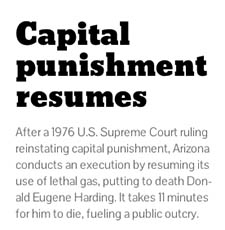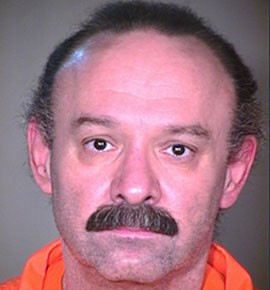Cronkite News has moved to a new home at cronkitenews.azpbs.org. Use this site to search archives from 2011 to May 2015. You can search the new site for current stories.
Corrections department renews registration to import execution drug
WASHINGTON – The Drug Enforcement Administration on Thursday renewed the Arizona Department of Corrections’ registration to import pentobarbital, the drug of choice for executions in states that allow lethal injection.
The notice comes just six weeks after the state executed Joseph Wood Jr. using a different set of drugs, midazolam and hydromorphone, in a process that took almost two hours and that witnesses said left Wood gasping for air.
“I would think they want it (pentobarbital) because what happened during their last execution was an embarrassment,” said Richard Dieter, executive director at the Death Penalty Information Center. He called pentobarbital the “most desired drug for states who administer the death penalty.”
But the drug has become increasingly hard for states to come by, as some manufacturers have refused to sell the drug for lethal injection.
Officials at the Arizona Department of Corrections would not comment on the DEA approval Thursday, except to note that it was a renewal of a previous license to import. A call to the DEA was not immediately returned Thursday.
The renewal is just one step in what would be a long process toward the importation of pentobarbital, said experts familiar with the process. In addition to the DEA approval, the corrections department would also have to be granted approval from the Food and Drug Administration to import the drug.
Even then, they might be hard-pressed to find a seller, Dieter said.
“The major manufacturers don’t want to sell it for executions,” Dieter said.
While a “local pharmacist might be able to put it together,” Dieter said, Arizona has not been able to get the drug from compounding pharmacies as states like Texas and Missouri have done.
Dale Baich, the assistant federal public defender for Arizona, said he asked the state before Wood’s execution where it acquired the two drugs it planned to use in the execution.
“They refused to tell us the source,” Baich said.
Wood, convicted of a 1989 double-murder in Tucson, spent 23 years on death row before his execution on July 23. Witnesses said in published reports that Wood spent almost two hours strapped to a gurney in the death chamber after the lethal drugs were administered, gasping for air about 600 times by one count.
Donna Hamm, executive director of Middle Ground Prison Reform, said the focus on which medications to use for executions is simply a way for death-penalty supporters to kill “without the spectacle.”
Hamm said that for death-row inmates, a life behind bars is punishment enough.
“People don’t realize what the loss of freedom means,” she said. “That is a harder punishment.”
But, for states that do have the dealth penalty, pentobarbital is “paving the way for quick, relatively quick executions,” Hamm said.
Baich said it is important for the public to know where the state acquires drugs that it uses for its executions.
“The public should be fully informed about how the ultimate punishment is carried out,” Baich said. “That includes the drugs that are used during the execution.”








